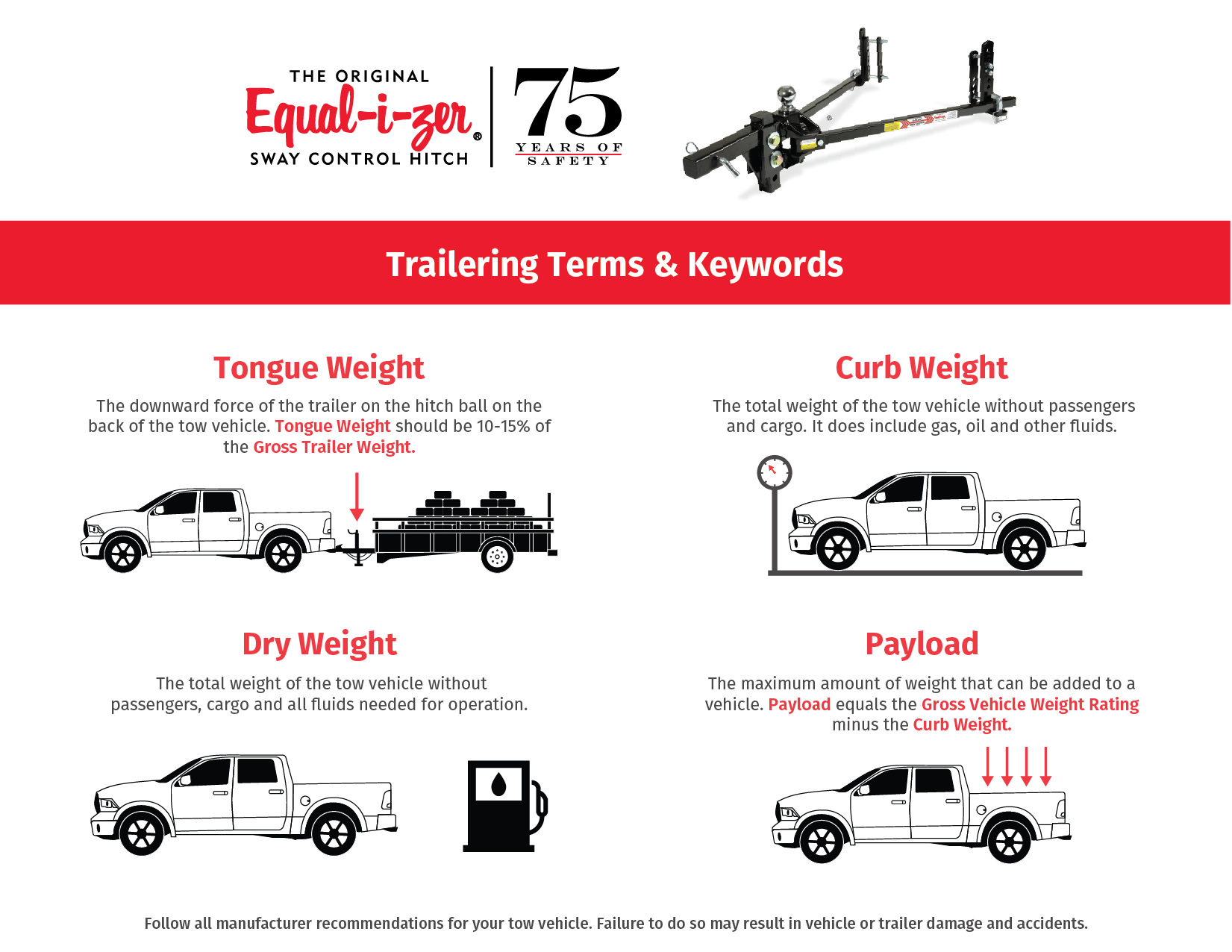In the realm of transportation, the consequences of exceeding a truck’s weight limit can be severe and far-reaching. When a truck takes on a load that surpasses its designated capacity, a cascade of effects ensues, leading to potential safety hazards, structural damage, and increased wear and tear on crucial components. The repercussions of overloaded trucks not only endanger the well-being of drivers and other road users, but they also pose economic challenges and strain the infrastructure. Understanding the intricate repercussions of surpassing weight limits is paramount for individuals and industries alike.

This image is property of cdn.hswstatic.com.
Effects of Excessive Weight on Trucks
Increased Braking Distance
One of the most significant effects of excessive weight on trucks is the increased braking distance. When a truck is carrying too much weight, it puts a strain on the braking system, making it more difficult for the truck to come to a complete stop in a timely manner. This increased braking distance not only poses a risk to the driver and other vehicles on the road but also reduces the overall effectiveness of the truck’s braking capabilities. As a result, it becomes harder to avoid accidents and ensure the safety of everyone involved.
Loss of Control
Excessive weight also leads to a loss of control over the truck. When a truck is overloaded, it becomes more challenging for the driver to maneuver the vehicle properly, especially in emergency situations. The added weight can make the truck less stable and more prone to tipping over or swerving uncontrollably. This loss of control not only endangers the driver but also puts other motorists at risk. It is crucial for truck drivers and fleet operators to understand the importance of proper load management to prevent such incidents from occurring.
Tire Blowouts
Another consequence of excessive weight on trucks is an increased risk of tire blowouts. Overloaded trucks exert excessive pressure on the tires, causing them to wear out at a faster rate and making them more susceptible to blowouts. The constant strain on the tires increases the chances of a tire failure, leading to potential accidents and delays. Regular inspections and maintaining proper tire pressure are essential to mitigate this risk and prevent dangerous blowouts.
Damage to Roadways
Overloaded trucks significantly contribute to the deterioration of roadways. The excessive weight puts excessive stress on the infrastructure, causing cracks, potholes, and other forms of damage. These damages not only reduce the lifespan of the road but also require repairs, putting a strain on local budgets and taxpayer funds. Moreover, damaged roads become hazardous for all vehicles, leading to increased accidents and a decrease in overall road safety. Therefore, it is crucial to adhere to weight restrictions and load limits to prevent unnecessary damage to the roads.
Overheating
Excessive weight puts a tremendous strain on the engine and cooling system of a truck, leading to overheating. When a truck is overloaded, the engine has to work harder to compensate for the additional weight, causing it to generate excessive heat. This can lead to serious engine damage and even cause the engine to overheat, resulting in vehicle breakdowns. Regular maintenance and monitoring of the truck’s cooling system are imperative to prevent overheating and ensure the longevity of the vehicle.
Decreased Fuel Efficiency
Overloaded trucks suffer from decreased fuel efficiency. The additional weight causes the truck’s engine to work harder, consuming more fuel to maintain the desired speed and performance. As a result, more frequent refueling becomes necessary, leading to additional fuel costs for trucking companies. This decreased fuel efficiency not only impacts the profitability of fleet operations but also contributes to additional environmental pollution. By properly managing the load and adhering to weight restrictions, trucking companies can significantly improve their fuel efficiency and reduce their overall operating costs.
Legal Consequences of Overloaded Trucks
Fines and Penalties
Operating an overloaded truck can lead to significant fines and penalties. Government authorities enforce strict regulations concerning weight restrictions and load limits to ensure road safety and preserve the integrity of the infrastructure. Violating these regulations can result in hefty fines, which can significantly impact the financial stability of trucking companies. These fines also serve as a deterrent to prevent overloading practices and encourage compliance with weight restrictions.
Potential Lawsuits
Overloaded trucks pose a greater risk of accidents, which can result in potential lawsuits. When an accident occurs involving an overloaded truck, the consequences can be severe, leading to injuries, property damage, and even fatalities. In such cases, victims may file lawsuits against the trucking company, seeking compensation for their losses. These lawsuits can be financially burdensome for trucking companies and potentially tarnish their reputation. It is crucial for trucking companies to prioritize safety and adhere to weight restrictions to minimize the risk of accidents and subsequent legal consequences.

This image is property of www.weigh-safe.com.
Safety Measures to Prevent Overloading
Weight Restrictions and Load Limits
One of the most effective safety measures to prevent overloading is the establishment and enforcement of weight restrictions and load limits. These regulations specify the maximum weight a truck can carry safely, considering factors such as the type of truck, its components, and the condition of the roads. Adhering to these restrictions is essential to ensure the safety of the driver, other motorists, and the structural integrity of bridges, highways, and roadways. Trucking companies must educate their drivers and closely monitor their compliance with weight restrictions.
Proper Vehicle Maintenance
Regular and thorough vehicle maintenance plays a vital role in preventing overloading and ensuring road safety. Trucks should undergo routine inspections to identify any mechanical issues that could compromise their ability to handle heavy loads. Components such as brakes, tires, and suspension systems should be inspected and maintained to ensure they are in optimal condition. By prioritizing vehicle maintenance, trucking companies can detect and address potential problems early on, reducing the risk of accidents and overloading-related issues.
Investing in Advanced Technology
Advancements in technology have led to the development of various tools and systems that can help prevent overloading and enhance safety. Trucking companies can invest in onboard weighing systems, load sensors, and telematics to monitor the weight distribution and ensure that trucks are not overloaded. These technologies provide real-time data on the load and can alert drivers and fleet managers if the weight exceeds legal limits. By utilizing advanced technology, trucking companies can improve load management, optimize fuel efficiency, and enhance overall safety.
Driver Training and Education
Effective driver training and education are integral to preventing overloading incidents. Truck drivers should undergo comprehensive training programs that cover load management, weight restrictions, and the importance of complying with traffic regulations. Additionally, ongoing education and refresher courses can keep drivers updated on the latest industry practices and regulations. By investing in driver training and education, trucking companies can foster a safety-conscious culture, minimizing the risk of overloading and promoting responsible road behavior.

This image is property of www.weigh-safe.com.
Economic Impact of Overloading
Increased Maintenance and Repair Costs
Overloading trucks leads to increased maintenance and repair costs. The excessive weight places more strain on various components, resulting in accelerated wear and tear. Brakes, suspension systems, tires, and engines are particularly affected, requiring more frequent repairs and replacements. These additional maintenance expenses can quickly add up, impacting the profitability of trucking companies. By preventing overloading, companies can reduce the frequency of repairs and extend the lifespan of their vehicles, ultimately minimizing maintenance costs.
Decreased Lifespan of Vehicles
Overloading has a detrimental impact on the lifespan of trucks. The constant stress and strain caused by excessive weight accelerate the wear and tear of various components, significantly reducing their operational lifespan. Components such as brakes, suspensions, and tires may fail prematurely, necessitating costly replacements. The decreased lifespan of vehicles also leads to increased fleet turnover rates, requiring trucking companies to invest in new vehicles more frequently. By adhering to weight restrictions, companies can protect their assets and maximize the longevity of their vehicles.
Delays and Loss of Productivity
Overloading can lead to delays and a loss of productivity. When a truck exceeds its weight limits, it becomes more challenging to maintain optimal speed and maneuverability. This can result in slower travel times, increased stopping distances, and difficulty navigating through congested areas. Delays in deliveries can have significant economic implications for both trucking companies and their clients. By prioritizing proper load management, companies can ensure timely deliveries, maintain productivity levels, and foster positive relationships with their customers.

Environmental Consequences of Overloaded Trucks
Increased Emissions and Pollution
Overloaded trucks contribute to increased emissions and pollution. By working harder to carry the additional weight, the engine consumes a larger amount of fuel, resulting in higher carbon dioxide (CO2) emissions. These emissions contribute to air pollution and climate change, further exacerbating environmental concerns. Additionally, the strain placed on the engine due to overloading can result in inefficient combustion, leading to the release of excess pollutants. To minimize the environmental impact, trucking companies must prioritize proper load management and fuel efficiency.
Damage to Infrastructure and Natural Resources
Overloaded trucks cause significant damage to infrastructure and natural resources. The excessive weight puts stress on roads, bridges, and highways, accelerating their deterioration and necessitating costly repairs. Repairing and maintaining infrastructure creates a strain on municipal budgets, ultimately impacting taxpayers. Moreover, overloading also damages natural resources such as soil and water bodies, leading to soil erosion and the contamination of water sources. By adhering to weight restrictions and load limits, trucking companies can mitigate these environmental consequences and preserve valuable resources.

This image is property of fifthwheelst.com.
Benefits of Proper Load Management
Improved Safety and Performance
Proper load management leads to improved safety and performance of trucks. By adhering to weight restrictions and load limits, truck drivers can better maintain control of their vehicles, reduce braking distances, and minimize the risk of accidents. Additionally, proper load management ensures that trucks operate within their optimal capabilities, enhancing overall performance and maneuverability. By prioritizing load management, trucking companies can create a safer working environment for their drivers, reduce accidents, and enhance the overall performance of their fleet.
Reduced Costs and Environmental Impact
Implementing proper load management practices results in reduced costs and a smaller environmental impact. By avoiding overloading, trucking companies can minimize maintenance and repair expenses, prolong the lifespan of their vehicles, and reduce the frequency of fuel refills. This reduction in costs directly contributes to increased profitability and financial stability. Furthermore, by optimizing load management, companies can minimize fuel consumption, lower carbon emissions, and mitigate their overall environmental footprint. Prioritizing proper load management aligns with sustainable business practices and promotes environmental stewardship.
In conclusion, the effects of excessive weight on trucks are vast and have far-reaching consequences. From increased braking distance and loss of control to tire blowouts and damage to roadways, the risks posed by overloading are significant. Moreover, legal consequences, such as fines and potential lawsuits, underscore the importance of adhering to weight restrictions. Implementing safety measures such as weight restrictions and load limits, proper vehicle maintenance, investing in advanced technology, and driver training can help prevent overloading incidents. The economic impact of overloading includes increased maintenance and repair costs, decreased lifespan of vehicles, and delays in productivity. Environmental consequences range from increased emissions and pollution to damage to infrastructure and natural resources. However, prioritizing proper load management brings several benefits, including improved safety and performance, reduced costs, and a smaller environmental impact. By understanding and addressing the effects of excessive weight on trucks, the trucking industry can prioritize safety, sustainability, and efficiency.
